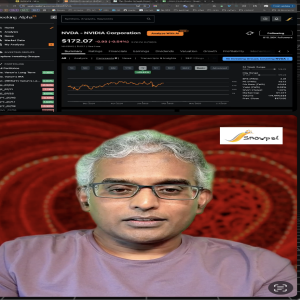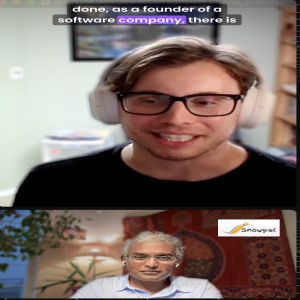Software Development, Finance and AI
We’ve been doing Software Development and Architecture work for a while at Snowpal, and currently have several B2B and B2C products in production. In this podcast, we’ll share our experiences on a regular basis to help you & your teams build great software. The topics covered in this podcast will include Product Management, Project Management, Architecture, Development, Deployment, Security, Release Management, Sales, Marketing, Advertising, and just about everything else an ambitious, fast growing startup based out of the US is likely to be involved in. So, join us. Let’s become better!
We’ve been doing Software Development and Architecture work for a while at Snowpal, and currently have several B2B and B2C products in production. In this podcast, we’ll share our experiences on a regular basis to help you & your teams build great software. The topics covered in this podcast will include Product Management, Project Management, Architecture, Development, Deployment, Security, Release Management, Sales, Marketing, Advertising, and just about everything else an ambitious, fast growing startup based out of the US is likely to be involved in. So, join us. Let’s become better!
Episodes

Monday Sep 15, 2025
Price Targets vs Reality: Lessons for Traders and Investors
Monday Sep 15, 2025
Monday Sep 15, 2025
In this podcast episode, Krish Palaniappan discusses the concept of price targets for securities, their reliability, and how they can influence investment decisions. He explores the differences between long-term and short-term investment strategies, the biases that can affect price targets, and the importance of careful analysis when making investment choices. The conversation also touches on the upcoming FinTech product being developed by Snowpal.

Monday Sep 08, 2025
Monday Sep 08, 2025
In this episode, Krish Palaniappan interviews Jim Spignardo, the Director of Cloud Strategy and AI Enablement at ProArch. They discuss the evolving landscape of AI adoption, particularly for small and medium-sized businesses, and the challenges these organizations face in implementing AI technologies. Jim shares insights on the importance of understanding pain points, the role of data, and the necessity of having clear strategies for AI integration. The conversation also touches on the impact of AI on consulting practices, the future of college education, and the changing dynamics of team roles in the tech industry.

Monday Aug 25, 2025
Monday Aug 25, 2025
In this engaging conversation, Krish Palaniappan speaks with Marnie Stockman and Nick Coniglio, co-authors of The Business of You. They discuss the importance of personal development, the iterative process of writing a book, and the role of AI in the writing landscape. The authors emphasize the need for individuals to take charge of their own lives and careers, likening it to being the CEO of oneself. They share insights on the tools they use for writing, the balance between content and engagement, and the significance of storytelling in making a lasting impact. The discussion concludes with thoughts on the future of writing in an AI-driven world.
![[Paid Course] Snowpal Education: 36 Ways AI Is Rewriting Work as We Know It](https://pbcdn1.podbean.com/imglogo/ep-logo/pbblog8090054/Podcast_Thumbnails_3_7es4w_300x300.jpg)
Thursday Aug 21, 2025
[Paid Course] Snowpal Education: 36 Ways AI Is Rewriting Work as We Know It
Thursday Aug 21, 2025
Thursday Aug 21, 2025
The End of Work (as you knew it). You are not ready for what AI is about to do to your job. This course can serve as a field guide to the AI Era.
What if everything you thought you knew about work, teams, and learning was about to be rewritten—almost overnight?
From solo developers building billion-dollar startups to non-coders shipping software in hours, AI is not just transforming productivity—it’s redefining roles, shrinking teams, eliminating busywork, and raising big questions about what skills still matter.
Purchase course in one of 2 ways:
1. Go to https://products.snowpal.com/s/education, and purchase it on the Web
2. On your phone:
(i) If you are an iPhone user, go to http://ios.snowpal.com, and watch the course on the go.
(ii). If you are an Android user, go to http://android.snowpal.com.

Monday Aug 18, 2025
Sales: The most misunderstood function in business (feat. John Betancourt)
Monday Aug 18, 2025
Monday Aug 18, 2025
In this conversation, Krish Palaniappan and John Betancourt, CEO of Humantelligence, delve into the complexities of sales, often regarded as the most misunderstood function in business. They discuss the importance of integrating sales strategies early in product development, the challenges of handling rejection, and the necessity of market research. The conversation highlights how sales processes have evolved with technology, particularly the impact of AI tools, and emphasizes that even established companies must continuously adapt their sales strategies to remain relevant. Throughout the discussion, key takeaways include the need for resilience in sales, the significance of networking, and the understanding that a great product alone does not guarantee success in the market.

Tuesday Aug 05, 2025
Tuesday Aug 05, 2025
In this conversation, John Betancourt, CEO of Humantelligence, discusses the transformative impact of AI on talent management, leadership development, and coaching. He highlights the challenges faced in these areas before the advent of AI, including the limitations of psychometric assessments and the exclusivity of coaching for top executives. Juan explains how AI democratizes access to these tools, making them available to all employees and enhancing their effectiveness. He also shares insights on sales and marketing strategies for B2B SaaS companies, emphasizing the importance of relationships and understanding the market. The discussion concludes with reflections on the future of work and the role of AI in shaping it.

Friday Jul 18, 2025
NASDAQ’s Spring Rally: A 3.5-Month Climb Through Volatility and AI Hype
Friday Jul 18, 2025
Friday Jul 18, 2025
In this podcast, Krish Palaniappan discusses the recent performance of the NASDAQ, analyzing market trends, volatility, and the impact of AI on trading. He provides insights into historical comparisons, daily fluctuations, and potential investment opportunities, while also addressing the current market sentiment and future predictions.

Monday Jul 14, 2025
Monday Jul 14, 2025
In this podcast episode, Krish Palaniappan and Mike Rispoli, CTO of Cause of a Kind, discuss the transformative impact of AI on software development. They explore how AI tools have evolved, the balance between human intellect and AI capabilities, and the changing dynamics of development teams. The conversation emphasizes the importance of problem-solving skills over specific programming languages and the future of software engineering in an AI-driven world. In this conversation, Mike Rispoli discusses the evolving landscape of software development in the age of AI. He emphasizes the increasing importance of soft skills, communication, and adaptability in hiring practices. The discussion covers the diminishing emphasis on traditional qualifications like college degrees, the changing dynamics of team composition, and the impact of AI on code quality and developer roles. Rispoli also shares insights on the future of software engineering, the role of consulting, and the necessity for developers to embrace new technologies and methodologies.

Monday Jul 07, 2025
Monday Jul 07, 2025
In this episode, Krish Palaniappan speaks with Ryan Caracciolo, founder of Striventa and Hyperdrive, about the intersection of sales and marketing and how to drive business growth. They discuss the importance of building relationships, understanding the sales funnel, and the role of inbound marketing. Ryan emphasizes the need for consistency in outreach efforts and the value of creating compelling content to attract qualified leads. The conversation also touches on the evolving nature of sales in a tech-driven world and the necessity for developers to embrace sales as part of their roles. In this conversation, Ryan Caracciolo shares insights on how to create compelling content by interviewing existing customers, emphasizing the importance of understanding market needs. He discusses the balance between being a pioneer and a follower in business, and the necessity of investing in sales and marketing for startups. The dialogue also covers navigating difficult sales conversations, building trust through discovery, and the role of developers in sales and marketing strategies.

Thursday Jul 03, 2025
Uber vs Tesla: Compare/Contrast
Thursday Jul 03, 2025
Thursday Jul 03, 2025
In this podcast episode, Krish Palaniappan discusses the evolving landscape of finance and technology, focusing on the business models of Tesla and Uber. He explores Tesla's expansion into Robotaxis and its implications for Uber's ride-hailing services. The conversation delves into market performance, sales analysis, and the competitive edge provided by data and technology. The episode concludes with financial insights into both companies and a look at future prospects in the mobility sector.







